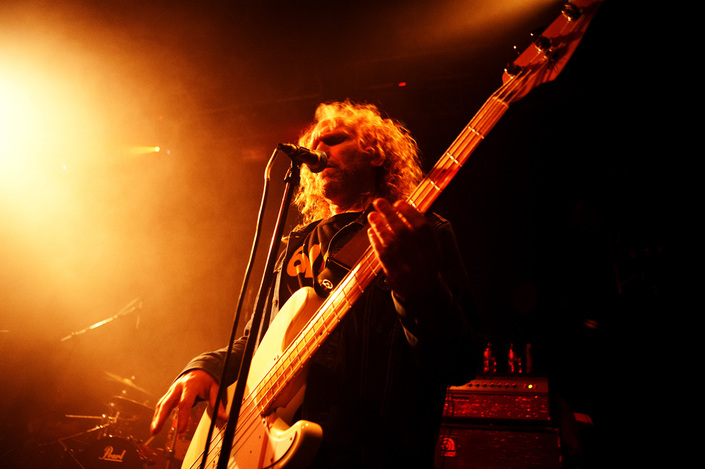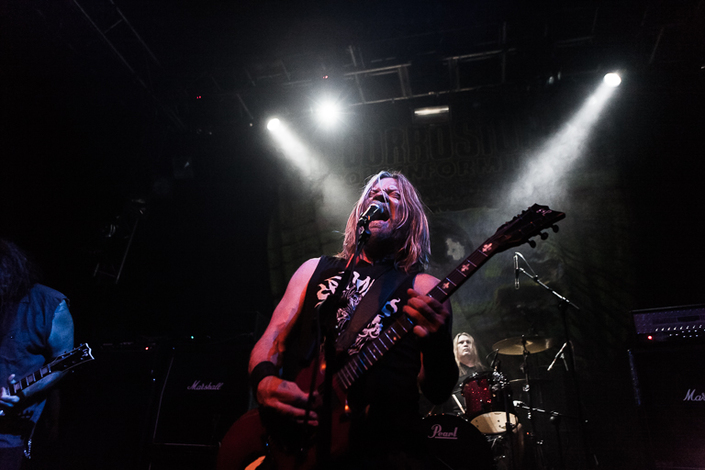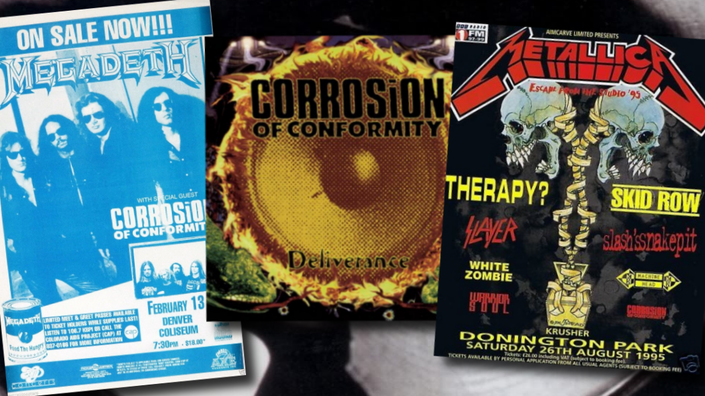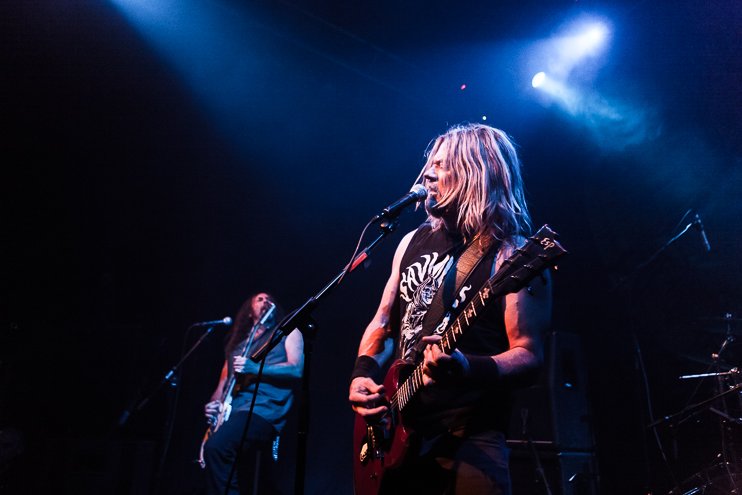|
Evolving from hardcore punk pioneers to sludgy Sabbath-esque southern metal behemoths, Corrosion of Conformity are a band best known for their celebrated ‘Deliverance’ line-up. Featuring founding members drummer Reed Mullin, bassist Mike Dean, and guitarist Woody Weatherman along with New Orleans native Pepper Keenan on guitar and vocals, the South Carolina band reunited in 2015 following Keenan’s extended sabbatical with Down. Although they never split up - the remaining three reverting back to their pre-Keenan incarnation - plans are now afoot for a new album from the celebrated four-piece, their first in over a decade. We caught up with Mike Dean on a short Irish jaunt, to discuss the new album, as well as covering some C.O.C history. Voting with a Bullet: Eamon O’Neill
How are you today Mike?
I’m well. You’re back on a short tour that sees you play two Irish dates. We were looking for agreeable dates to play around an offer to play Desertfest, and you know, we like Ireland. We were actually at the place last night we played as a three piece in 2012. It was looking familiar anyway, that’s what I thought. We have some friends in Dublin, some musician friends, buskers that play around town. You’re heading to Belfast for tonight’s show. We’re pinned to the left side of the road as these like, Ferraris and McLarens are blazing by [The Gumball 3000 Rally launch has taken place in the city today - Ed.]. It’s some kind of race apparently, I don’t know. Will we be joining them? Not in this small bus, no. You’ve been recording a new album with Pepper Keenan back in the band. What can you tell me about it? Well, there’s not much to say, and what I could say I can’t really say at this point. Until recently it was mostly talk, and we just got started with a little bit of song writing and jamming and putting all that together. Suffice to say we have some concepts, and we’ve yet to see if they pan out. I don’t want to give too much away, but we’re psyched about it and we’re just about to seriously get to work. It’s been around fifteen years since this line-up recorded an album. Is the magic still there?
I think the magic is still there, or some magic is still there. You know, it’s cool to have sort of an updated approach. I mean, it’s the same old thing for sure, but we’re kind of being in the moment, and just seeing what we come up with. Will the new album get a release this year? I wouldn’t make any guesses or promises as and when it’s going to be released. I think we’ll certainly finish it this year. If you’re going to wait this long you might as well do it right. That said, personally, I like things to move along, and to work quickly, so yeah, I think it will. I wanted to talk about a little C.O.C history starting with the ‘Deliverance’ album. What do you remember about its recording? I came in a little ways into the whole process, because they had begun work on that record when they lost their singer [Karl Agell] and bass player [Phil Swisher]. So that whole thing was kind of turning into chaos a little bit. Then I got back involved with the band, but the question of the singer wasn’t really solved. So we convinced Pepper to take it on, to take on most of that responsibility. What I remember is having some rough tracks and demos and learning the parts. But the whole song writing process was kind of half-finished, and once we made the decision to go forward like that, we came together really quick. But I just remember going and doing some overdubs at Electric Lady [studios] in New York and being really excited to work in Eddie Kramer’s studio; a place where there’s a history of music that I really admire. So that was like a really cool thing. You sang lead vocals on the title track. It’s not one that you currently play live, is it? We’re not playing it so far, but I’m open to whatever. There’s a set list of songs that we’d like to play, and a deficit of time. There’s quite a few songs that we’ve never played live that I would love to play. I think ‘Born Again For The Last Time’ [From 1996's ‘Wiseblood'] would be a bad ass song to play live - I don’t remember ever having played it. ‘Wishbone’ [also from ‘Wiseblood] is one that we’ve played maybe twice. The band really arrived commercially when ‘Deliverance’ was released. Were you surprised by its success? No. When I was talking to them about coming back and playing bass, I was curious to hear some stuff, and when I heard some of the raw simple tracks of what was done so far; you could just tell by the size of it and the heaviness and simplicity, that it had potential to reach a wider audience without really compromising anything or being overly, desperately commercial or anything like that. I was actually surprised it didn’t do more. You played a pretty high profile tour with Megadeth in 1995 to support the album. Yeah, it was a little bit of a strange one. You have this whole organisation that was kind of bound by the artist’s supposed recovery, and the hard working crew were not to be seen with a beer or whatever, because apparently somebody was recovering from some type of addiction – and the whole time the guy is using drugs and shit like that. It was pretty obvious, so I just remember walking up to Dave [Mustaine, Megadeth band leader] smoking a joint *laughs*, and getting in trouble. We were actually hoping to get asked to leave the tour and have justification. But it was good crowds and it was a great opportunity, and I have to say that Dave Ellefeson [Megadeth bassist] and Marty Friedman [Megadeth’s guitarist at the time], those are really nice guys. We met some people on that crew who are like friends to this day, so it was a good experience. May be that was a little bit of bad behaviour on my part. You played at Donington the same year. Well that whole experience was kind of surreal because I’d never been to a show that large, and I’d not performed at one. I’d never seen that many people assembled at 11.20 in the morning. But, it’s not even real, like. At that point I’d played a lot of rock shows, but it would be a situation where I could see the whites of the audience’s eyes, but that many; sixty, eighty thousand people, that’s so impersonal and so surreal. But the whole cultural thing where you bring beer in in a plastic bag, and then you drink the beer and then you piss in the plastic bag and then you show your appreciation for the music by throwing the plastic bag towards the stage? That was so, that was a little different. Not what I’m used to. * laughs * The last album you recorded with Pepper was ‘In The Arms Of God’, which was a darker C.O.C album. Did it reflect your mood at the time?
No, not really. I don’t think that the subject matter reflects that it was a dark period for the band. Maybe it was sort of a dark period for humanity, or for society and civil discourse. I mean, that was around the time where in the United States, we had this whole 9/11 attacks that were seen as very fishy, and then used as a justification for making war on a country. None of it really made any sense, and there was a sort of ‘herd-like’ mentality of people going along with this patriotic unquestioned rhetoric. You could see that it was unjustified and a real pointless exercise, and that was the backdrop to some of those songs and that period. It’s not like a political record or anything – it’s the backdrop for it. Was it strange recording without Reed Mullin? It was hard to think about making a record without Reed – it was kind of crazy in fact. I think as far as the vibe of the band, it was like super-creative, and Pepper had talked Stanton Moore into playing drums, so it had to be; if you’re going to have a drummer that hits hard and that’s just special, you can’t really replace them, so you just have to find another super power like that, and Stanton Moore did a great job. Did you know at the time that it would be the last C.O.C album for quite some time? We just kind of presumed that we were going to do some more, but we got into that Hurricane Katrina time then, and that was when the New Orleans people were just kind of rallying, and I think at that point, that’s when Down rallied and got real busy. And that kind of f**ked up our scene, but I sort of understand it. But no, we didn’t really see that stopping. I don’t think anybody did. It was a bit of a surprise. But you’re back now. Well, we never really went anywhere, We were working on stuff in a couple of different bands. Reed and I had a band called Righteous Fool, and before that Woody and the guy that was playing drums on that tour, Jason Patterson hung around a little bit. Then we got offers for the three-piece, so we dusted that off and made two killer albums [ 2012’s ‘Corrosion Of Conformity’ and 2014’s ‘IX’] and an EP [2012’s ‘Megalodon’]. We’re back in this incarnation, but we haven’t really gone anywhere. Outside of C O.C, you worked with Dave Grohl on the Probot project. What was it like working with him? He has a lot of cool concepts, but the Probot thing was a very cool idea, and I think that that whole Sound City thing is obviously an extension of the whole idea; the collaborative thing. He put together some unsung people; vocalists whose music he admired, and he created a pretty good effort there. I was definitely big on the Lee Dorian track [‘Ice Cold Man’] which as actually supposed to be Eric Wagner’s track - he switched. But it wasn’t like a super close collaboration. I got an email and it was like; “yeah, I’d like to do it”, and then someone sent us a very tiny reel of two inch tape in the mail, and we took it into a studio. It was a very short hardcore song, and I just had a very Bad Brains-inspired idea. It took about ten minutes of recording, and about an hour to check it over, and I sent it back to him. That’s about the extent of it. Then somebody wrote me a check. That was like two thousand dollars for about an hours’ work. Finally, with Corrosion Of Conformity back to what most would regard as the ‘classic’ line-up, I wondered who you’d like to see reform?
I would like to see Black Sabbath reform because in my opinion, they haven’t reformed because Bill Ward isn’t there. Bill is one of the top drummers and creative people of the last sixty years or so. To make two Black Sabbath records without Bill Ward, it’s just bullshit. I worked a show where Black Sabbath played in 2005 or so, and Bill Ward was like practicing drums on the desk, talking to the hands – he had all his chops, he had all his Ginger Baker-esque, Elvin Jones jazz chops, he was playing hard just doing like ‘Wicked World’ stuff. And they say he can’t do it? They’re my favourite band and I just can’t believe what they’re doing. Any thoughts on the Axl Rose fronted AC/DC? AC/DC basically lost me about the time that Bon Scott died. Part of maybe two albums [featuring Brain Johnson] are pretty killer, and then I tolerate it because, come on, Malcolm Young, you know? But now you’re down Malcolm, so that’s kind of a hard blow to recover from, and then you want to add Axl? I mean, I understand you’ve got to finish the tour or whatever, and I can try to empthasise with the position. Don’t get me wrong, the last three Guns ‘n’ Roses records, I never really appreciated them at the time, but now they’re almost like a guilty pleasure. But you know, not all of the music that I enjoy is not necessarily created by people I would like to hang around with. *laughs* Like this interview? Like us on FaceBook and follow us on Twitter for regular updates & more of the same. Corrosion of Conformity play Bloodstock Open Air which takes place in Catton Park, Derbyshire from 11 - 14 August. For ticketing information and more visit the official Bloodstock site. |
|
Corrosion Of Conformity
"It was a dark period for humanity, for society and civil discourse. That was the backdrop to some of those songs." - Mike Dean.
© 2016 - 2024 eonmusic.co.ukContact: [email protected]
|




